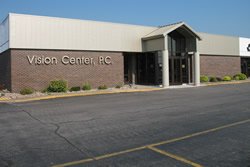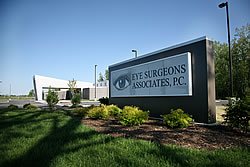By Yasser Elshatory M.D., Ph.D.
Age-related macular degeneration (AMD) is a common cause of vision loss in people 50 years and older. The single most important factor in determining who has this condition is age. A lot of progress has been made in the last 10 years in the treatment of AMD, with more innovative alternatives in trial today that will decrease the burden of treatment and may increase its effectiveness.
What you can do
Many people with dry macular degeneration do well and have little to no visual symptoms. Such patients require observation alone, as they only possess early features of the condition known as drusen, which are a deposition of material (protein and lipids) under the retina. If these drusen are large enough or numerous enough, your doctor may recommend an over-the-counter vitamin containing zinc, copper, lutein, xeazanthin, vitamin C and vitamin E which has been found to reduce the risk of progression to more advanced stages of macular degeneration by 25%.
Patients can decrease the risk of progressing to advanced stages of macular degeneration by not smoking, eating a lot of vegetables, and monitoring vision at home with a grid or graph paper known as an Amsler grid. This grid is sensitive at picking up sudden changes that indicate wet macular degeneration, where there is bleeding or leakage of fluid under the retina. Untreated, this bleeding and leakage can cause scarring under the retina that may lead to a permanent blind spot. When treated with regular eye injections, a patient’s vision is often preserved if not improved. Here are the most important things macular degeneration patients can do for themselves:
- Monitor vision between regular eye exams at home with an Amsler grid for sudden changes.
- Alert your eye care provider of these changes in a timely manner, as early detection and treatment may prevent vision loss.
- Do not smoke
- Eat a balanced diet with vegetables
- Wear sunglasses
- If recommended by your eye care provider, take the AREDS2 vitamin supplement, which may also help reduce the rate of progression. (Please check with your doctor before taking any supplements.)
Management of AMD
Although injections help save sight, they last in the eye only four to eight weeks. Two potential remedies on the horizon, however, would reduce the burden of such frequent treatments. A newer injectable drug may last up to 12 weeks and has shown promising results in initial clinical trials. The second remedy being explored requires a surgery to implant a refillable reservoir in the eye. This reservoir is then refilled every four to six months in the office to help this condition.
Dr. Elshatory is a board certified and fellowship trained retina specialist. His specialty interests include the medical and surgical treatment of age-related macular degeneration, diabetic retinopathy, retinal vascular disease, retinal detachment, macular holes, and macular pucker.
The material contained in this article is for informational purposes only and is not intended to be a substitute for professional medical advice, diagnosis, or treatment. Always seek the advice of your physician or other qualified health care provider.




